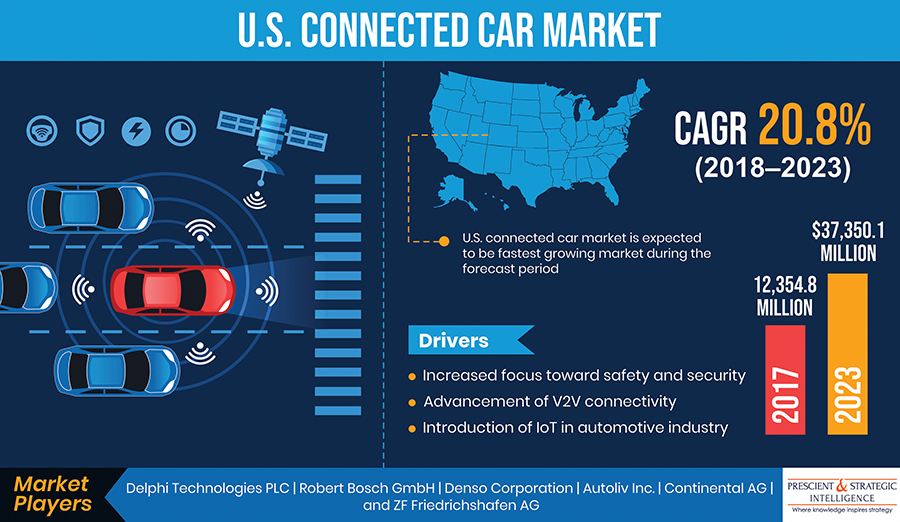With the rising incidents of road accidents globally, especially in the U.S., the need for road safety and security couldn’t be more dire. To provide customers that, the U.S. government is working on implementing stringent laws to enforce road safety. Therefore, original equipment manufacturers (OEM) are working on technologies that would make vehicles much more secure and the on-road experience much better. Technologies, such as automatic braking, lane assist, and advanced driver-assistance system (ADAS), are helping enhance driving experience, and curb traffic rule violations, which are significantly bringing down the road accident incidence. To enhance road safety, the National Highway Traffic Safety Administration (NHTSA) of the U.S. Department of Transportation recommends certain technologies, such as dynamic brake support, crash imminent braking, and other technologies, including pedestrian automatic emergency braking. The NHTSA works closely with numerous safety advocates and industry partners to spread awareness about passenger safety among automobile owners, thereby promoting the penetration of the connected cars in the country.
The components that make a car connected are sensors, processors, aftermarket services, OEM services, wireless & cellular modules, and fleet manager. In 2017, the demand for the fleet manager component was the highest. It is an operation manager interface, which helps in controlling real-time information provided by a connected vehicle fleet. The functions offered by the fleet manager are vehicle maintenance, vehicle financing, and vehicle telematics (tracking and diagnostics). In the coming years, the fastest growth in demand is expected to be for sensors. They help in identifying and spotting various dangers and points while driving on the road. They even help in communicating with adjacent vehicles, raise alerts if any other vehicle comes too close, or share warnings related to traffic accidents. The U.S. connected car market is predicted to register a 20.8% CAGR and generate a revenue of $37,350.1 million in the near future.
The inclusion of ADAS solutions in cars has paved the way for the autonomous vehicle (AV) technology. Many automotive OEMs have collaborated with technology partners, such as Volvo AB and Google LLC; NVIDIA Corporation and BMW AG) to deliver innovative products. Currently, the semi-autonomous vehicles are equipped with lane-departure warning system, adaptive front lighting systems, and surround view, which have led to the emergence of the AV technology. Even though the technology is being tested in a controlled environment, its incorporation in cars for commercial purposes is still underway. The acceptance of this technology among users is dependent on software and hardware innovations.
Nake Enquiry Before Buying th Report@ https://www.psmarketresearch.com/send-enquiry?enquiry-url=us-connected-car-market
The innovation in the mobility concept development is growing due to the rising popularity of connected cars in the U.S. automotive industry. Various research & development centers are being set up for the testing of new concepts in the connected car domain. Even though the sales of connected cars in the country reached an all-time high, these cars are still not affordable to majority of the consumer base. Therefore, research is being done in the direction to make these cars and technologies affordable for everyone, which is further expected to boost the U.S. connected car market.
More Others Reports From Automotive Industry 2020 by P&S Intelligence
Global Connected Car Market Report
Adaptive Cruise Control Market Demand Globally
Media Contact
Company Name: P&S Intelligence
Contact Person: Abhishek
Email: Send Email
Phone: +918887787886
City: New York
Country: United States
Website: https://www.psmarketresearch.com/market-analysis/solar-encapsulation-market


